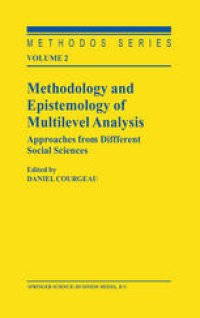
Ebook: Methodology and Epistemology of Multilevel Analysis: Approaches from Different Social Sciences
- Tags: Epistemology, Methodology and the History of Economic Thought, Epidemiology, Population Economics
- Series: Methodos Series 2
- Year: 2003
- Publisher: Springer Netherlands
- Edition: 1
- Language: English
- pdf
3 the observation focus on aggregate or individual behaviours? Will the meth ods used to identify the relationships between the values measured be the same or totally different depending on the level of observation? Can several aggregation levels be used simultaneously? and so on. The social scientist will also need to address the issue of time: Will it be historical time, in which the events studied unfold, or, on the contrary, the time lived by the individual who experiences the events? Will the observation point be a precise moment of that "lived" time, in order to explain the behaviours occurring then by con ditions prevailing immediately beforehand? Or, on the contrary, will the ob servation span an individual's entire life, involving constantly changing conditions? These issues have been present from the very beginning of social science research. We shall address them throughout this volume, and try to find satisfactory solutions. The multilevel approach-which has recently gained ground-tackles the issues from a fresh angle. Within the framework of a single model, it seeks to achieve a synthesis connecting individuals to the society in which they live. For this purpose, it uses intermediate levels, which can vary from one science to another: for example, class and school, in education; the village, the town, and the region, in human geography; the family, the household, and the con tact circle, in demography.
The possibility to analyse human behaviours taking account of the multiple contexts in which they occur, is opening a new research avenue in social sciences. This book considers, through examples drawn from different social sciences, the methodological challenges multilevel analysis permits to answer and points out some limitations of these models. It also considers the more general philosophical and epistemological issues raised by their use, as the multilevel approach offers a mean to combine causal and systemic explanations.